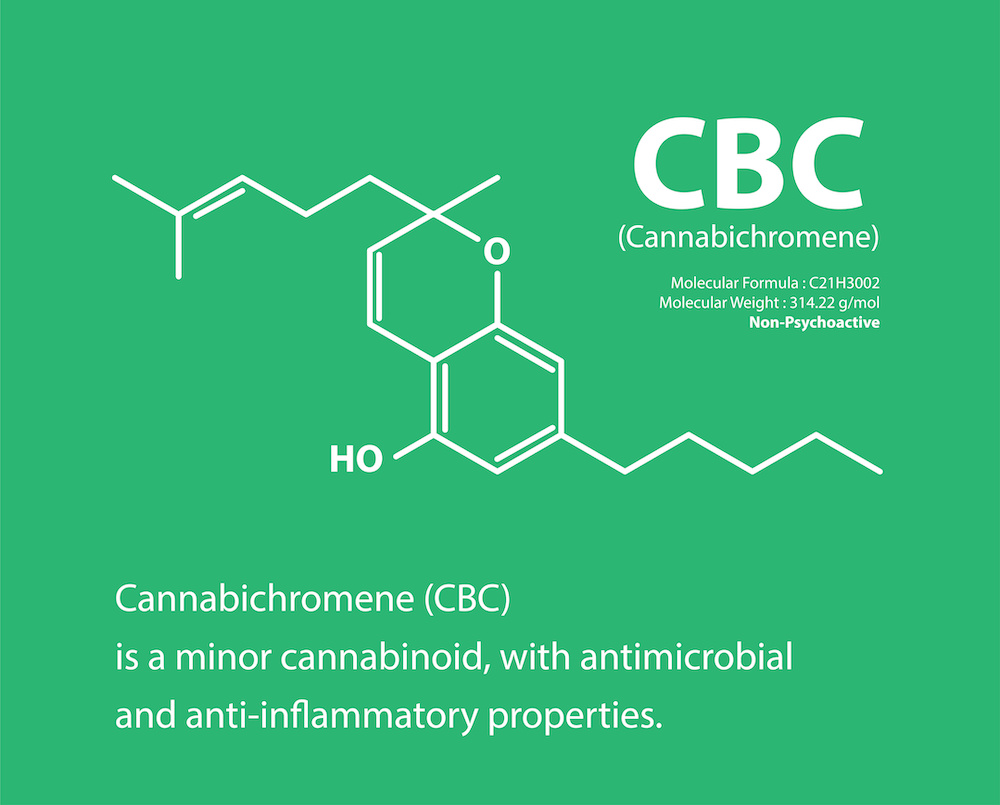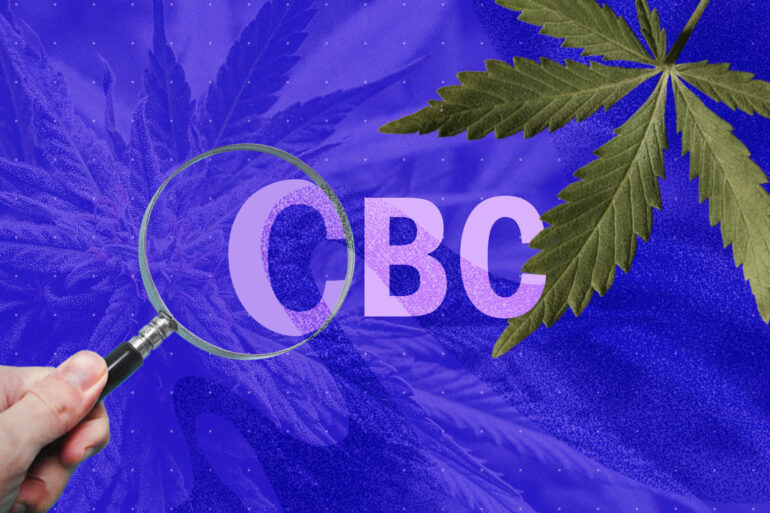Cannabichromene, or CBC, is a non-psychoactive cannabinoid that’s found naturally in the cannabis plant. Most evidence for CBC comes from preclinical studies, where it shows potential use for inflammation, pain, neuroprotection, seizures, microbial infections, colitis, and several types of cancer cells.
The specific side effects of CBC are still unknown, but it’s likely similar to CBD oil and has been shown to be well-tolerated and safe in a few clinical trials.
What Is Cannabichromene (CBC)?

Cannabichromene was first identified in 1966 and is one of the four most common cannabinoids, aka “the big four.” CBC lies at the end of a complicated lineage, naturally passing through stages of CBGA and CBCA until arriving at CBC. Separately, if CBDA is hit by UV light, it becomes CBC.
CBC can be found in small, variable amounts in cannabis and hemp-derived products, including flower, vape oil liquid, and more. In the cannabis plant, CBC levels peak during the early stages of a plant’s life cycle. Advanced breeding techniques increase CBC yield up to 90% in the first leaves, which declines to a final amount of 1-5% CBC as the plant matures.
CBC naturally breaks down into CBL. It can also be artificially converted into CBL or THC derivatives like cannabinol (CBN) if necessary.
CBC vs. THC: Key Differences
- THC gets you high, but CBC will not get you high because it does not activate CB1 receptors
- THC acts on CB1 and CB2 receptors, but CBC is stronger at CB2
- CBC’s anti-inflammatory and anticancer effects may be enhanced by THC
- CBC is widely available in legal hemp products, while THC is a federally-restricted compound with state-by-state exceptions
- CBC and THC bind to the same pain receptor families (e.g., TRP), but THC is recognized as a stronger agent than CBC. THC also binds to more pain receptor family members
CBC vs. CBD: Key Differences
- CBD and CBC are both non-intoxicating, but CBD is more plentiful and widely available than CBC in cannabis or hemp products
- Structural differences exist, but they share many benefits, especially neuroprotective and anti-inflammatory effects
- CBD may also be better than CBC for pain
- CBC and CBD are synergistic against cancer cells
What Are the Benefits and Effects of CBC?
Historically, cannabis research focused on the two main cannabinoids, CBD and THC, with CBC in the periphery.
The many potential benefits of CBC are similar and just now coming into view. Only three human studies have been done with CBC, with a focus on pharmacology. Hence, the potential benefits are based on animal and lab studies.
The effects of CBC may include:
- Antibiotic: Potent effects against S. aureus and B. subtilis strains
- Anticancer: Proapoptotic and antiproliferative effects on human and mouse tumor cell lines including prostate, breast, gastric, colorectal, urothelial, and leukemic
- Anticonvulsant: Demonstrated in mice
- Antidepressant: Supported by preclinical evidence
- Anti-inflammatory: Via CB2 and multiple pathways, enhanced by high doses and THC synergy. Potentially useful in inflammatory and painful conditions (e.g., colitis, chronic or neuropathic pain, neuroinflammation)
- ARDS: Novel lung-protective candidate in acute respiratory distress syndrome and systemic inflammation. CBC reversed hypoxia, relieved ARDS symptoms, and shielded lung tissue from inflammatory damage in mice models; potentially useful in COVID-19 infection pending human trials
- Gut motility: Reduced in mouse colitis models
- Pain-relieving: Evidence in multiple inflammatory pain mice models
- Neuroprotective: Induces and selectively enhances neurogenesis and brain stem cell growth. Possible future role in Alzheimer’s, hepatic encephalopathy, neuroinflammation disorders, and more
- Antifungal effects: Mild to moderate activity against multiple species
What Are the Side Effects of CBC?
To date, the only double-blind, clinical study on CBC demonstrates a good tolerability and safety profile when CBC is combined with THC and CBD. However, there are no specifically documented side effects for CBC.
- Since CBC is also usually present in CBD oils, the common side effects of CBD and hemp oil likely apply (e.g., sleepiness, diarrhea, etc.)
- Drug-drug interactions are not yet known, but likely similar low risk as with CBD oil
How Much CBC Should You Take?
Everyday consumers can now access full-spectrum CBC-dominant hemp and purified CBC products. When dosing CBC, you should consider that CBC can be preferentially absorbed first over THC and CBD.
Combined daily doses of up to 26.4 mg CBC, 480 mg CBD, and 20 mg THC were well-tolerated together in a 2021, double-blind publication.
However, such high doses of THC and CBD are not necessary and may cause other side effects. Consider asking your healthcare provider and an expert cannabis coach for specific CBC and combination recommendations.
Will CBC Get You High?
No, CBC will not get you high. Even though CBC interacts with your endocannabinoid system, it doesn’t trigger noticeable intoxication, cognitive impairment, or pleasurable effects we call being high.
But that doesn’t mean CBC can’t have positive effects on anxiety, depression, mood, sleep, and well-being, as other cannabinoids generally do. CBC may have antidepressant actions and increase anandamide (AEA), an important endocannabinoid that makes us feel good and regulates key functions.
Will CBC Show Up on a Drug Test?
Yes, CBC itself may show up on a drug screen, but it’s less likely than THC is. Usually, samples are flagged first for the target metabolite of THC (THC-COOH) before they look for CBC, if at all.
CBC could be a biomarker for recent herbal cannabis use, but it seems to be unreliable in that regard for forensic toxicologists.
Since THC and CBC naturally co-occur in cannabis, any full-spectrum products can compromise results. CBC is unlikely to be mistaken for THC or its metabolites, but they can still be detected in drug screening. CBC is detectable at a very low cutoff of 1 mg/mL, but only eight in 1,504 urine samples had detectable amounts of CBC in a 2023 study.
Conclusion
CBC is among the most common cannabinoids but it hasn’t been clinically studied enough. A plethora of potential benefits await human research confirmation.
Related Cannabinoids
- Cannabidiol (CBD)
- Cannabicyclol (CBL)
- Cannabinol (CBN)
- Tetrahydrocannabinol (THC)
- Tetrahydrocannabinolic acid (THCA)
- Delta-8 tetrahydrocannabinol (Delta-8 THC)
- Tetrahydrocannabivarin (THCV)
References (27)
- Vikingsson, S., et al. (2023). Prevalence of ∆8-tetrahydrocannabinol carboxylic acid in workplace drug testing.
- Filer, C. N., et al. (2022). Cannabinoid Photochemistry: An Underexplored Opportunity
- Souza, J. D. R., et al. (2022). Adverse Effects of Oral Cannabidiol: An Updated Systematic Review of Randomized Controlled Trials (2020–2022)
- Valeri, A., et al. (2023). Cannabichromene Induces Neuronal Differentiation in NSC-34 Cells: Insights from Transcriptomic Analysis.
- Peters, E. N., et al. (2022). Pharmacokinetics of cannabichromene in a medical cannabis product also containing cannabidiol and Δ9-tetrahydrocannabinol: A pilot study.
- Maioli, C., et al. (2022). Cannabinol: History, Syntheses, and Biological Profile of the Greatest “Minor” Cannabinoid.
- Benavides, A. (2021, October 25). All About Anandamide: Taking Cannabinoid Treatment to New Heights.
- Walsh, K. B., et al. (2021). Minor Cannabinoids: Biosynthesis, Molecular Pharmacology and Potential Therapeutic Uses.
- Khodadadi, H., et al. (2021). A potential role for cannabichromene in modulating TRP channels during acute respiratory distress syndrome.
- Zagožen, M., et al. (2021). Cannabigerol and cannabichromene in Cannabis Sativa L.
- Nachnani, R., et al. (2021). The Pharmacological Case for Cannabigerol.
- Cerino, P., et al. (2021). A Review of Hemp as Food and Nutritional Supplement.
- Anderson, L. L., et al. (2021). Cannabichromene, Related Phytocannabinoids, and 5-Fluoro-cannabichromene Have Anticonvulsant Properties in a Mouse Model of Dravet Syndrome.
- Anis, O., et al. (2021). Cannabis-Derived Compounds Cannabichromene and Δ9-Tetrahydrocannabinol Interact and Exhibit Cytotoxic Activity against Urothelial Cell Carcinoma Correlated with Inhibition of Cell Migration and Cytoskeleton Organization.
- Krämer, M., et al. (2021). Detectability of cannabinoids in the serum samples of cannabis users: Indicators of recent cannabis use?
- Guo, W., et al. (2021). Major Constituents of Cannabis Vape Oil Liquid, Vapor and Aerosol in California Vape Oil Cartridge Samples.
- Stone, N. L., et al. (2020). A systematic review of minor phytocannabinoids with promising neuroprotective potential.
- Salami, S. A., et al. (2020). It Is Our Turn to Get Cannabis High: Put Cannabinoids in Food and Health Baskets.
- Shahbazi, F., et al. (2020). Cannabinoids and Cannabinoid Receptors: The Story so Far.
- Tomko, A. M., et al. (2020). Anti-Cancer Potential of Cannabinoids, Terpenes, and Flavonoids Present in Cannabis.
- Cather, J. C., & Cather, J. C. (2020). Cannabidiol primer for healthcare professionals.
- Golombek, P., et al. (2020). Conversion of Cannabidiol (CBD) into Psychotropic Cannabinoids Including Tetrahydrocannabinol (THC): A Controversy in the Scientific Literature.
- Klahn, P. (2020). Cannabinoids-Promising Antimicrobial Drugs or Intoxicants with Benefits?
- Muller, C., et al. (2019). Cannabinoid Ligands Targeting TRP Channels.
- Huntsman, R. J., et al. (2019). Dosage Related Efficacy and Tolerability of Cannabidiol in Children With Treatment-Resistant Epileptic Encephalopathy: Preliminary Results of the CARE-E Study.
- Devinsky, O., et al. (2014). Cannabidiol: Pharmacology and potential therapeutic role in epilepsy and other neuropsychiatric disorders.
- Russo, E. B. (2011). Taming THC: Potential cannabis synergy and phytocannabinoid-terpenoid entourage effects.
Editor’s note: The original version of this article was published on November 10, 2021, by Ali Mans Cornwell.
